Chihuahuas are the actual proof that a dog barks worse than it bites. These tiny canines are known for their aggressive attitude that tends to make us laugh more than scare us.
Cute in their anger, Chihuahuas are among the most common pets in most parts of the world.
While the standard Chihuahua is tan-bodied, they can come in many different colors and patterns. One of them is the merle Chihuahua.
“Merle” means a spotted coat pattern, one that is usually made of a range of five to six colors that can express either as large markings or tiny specs.
We can all agree that this coat pattern makes any dog look rather unique.
Still, there are a few things that dog breeders aren’t telling you about merle Chihuahuas.
Here’s what you need to know.
Merle Chihuahuas Are Bred By A Mutation

A rare genetic mutation causes the merle pattern in Chihuahuas. This makes it one of the rarest coat colors in the breed, together with blue, pure white, or brindle.
This mutation causes a range of colors to be ‘splashed’ onto the Chi’s fur. While gray, white, and black dapple shades are the most common, they can even come in red hues or sable markings.
In other words, you can find Chihuahuas in red merle, black merle, or even a blue merle Chihuahua! There are many varieties of this coat pattern.
The same mutated merle gene causes a Chihuahua’s eyes and skin to be discolored. For example, your merle Chihuahua might have blue eyes and bright lips, noses, and toe pads.
This sounds unusual for dog owners who know that a Chihuahua’s eyes are usually dark.
In fact, this merle gene doesn’t really come from the Chihuahua breed. This pigmentation change is ‘delivered’ into a Chi’s genetic pool by cross breeding a Chihuahua dog with some other canine with a merle pattern.
While the papers might not say so, this means that all merle Chihuahua’s aren’t really purebred Chis. They always have at least one merle parent or at least an ancestor, such as a Poodle, a Border Collie, or a Cocker Spaniel.
Some even breed Chihuahuas with a Great Dane, which is known to have a merle coat.
In fact, the merle mutated gene is an incompletely dominant trait. In other words, a gene will always express itself if present. There is no way for a merle gene to stay hidden as it’s not recessive.
Even if you have a merle parent, it doesn’t guarantee merle Chihuahua puppies. This happens if the merle Chi passes genes from another, non-merle ancestor.
Despite the mutated gene, these are still Chihuahuas with all the breed’s features. Other than their fur color, they usually don’t differ from regular Chihuahuas at all.

Photo from:@harry.james.pupper
Merle Chihuahuas can have either short or long coats, so the grooming depends on the hair length. They’ll shed just as much as regular Chis – except this time, no upholstery color can save your furniture from looking hairy.
The longer the coat – the more grooming they’ll need. Chihuahuas with long hair will shed much more short-haired variations.
Luckily, though, Chihuahua’s are so small that maintaining their fur won’t take up too much time.
While we’re at their size, according to the American Kennel Club (AKC) breed standard, all Chihuahuas stand at around eight inches tall – at most! Their average weight is six lbs, so they are lighter than most cats!
At the same time, the Chihuahua breed is among the longest-living canine species. These pups have such a long lifespan that they can live more than 18 years!
All Chihuahuas Share The Same Personality
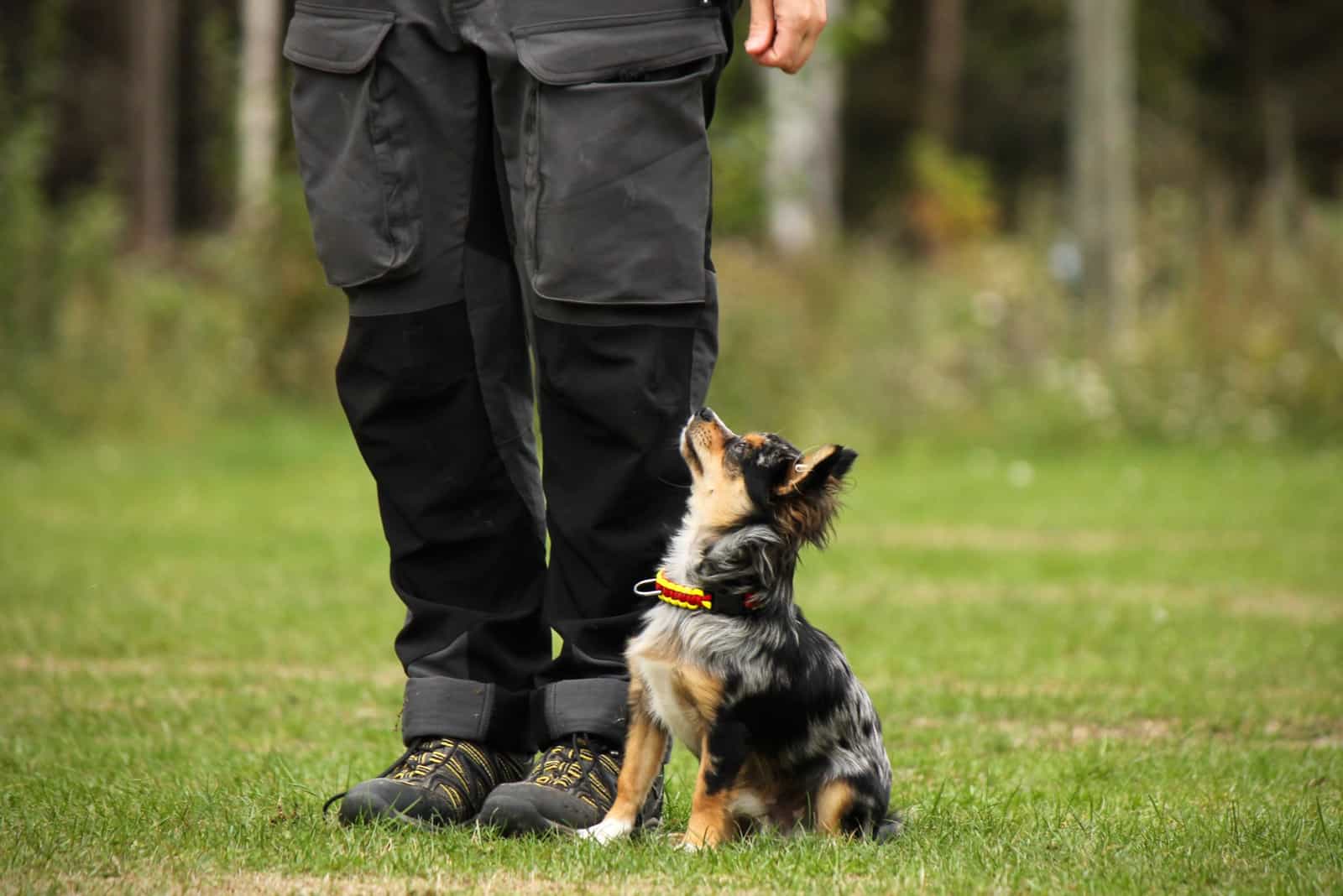
Despite their different coat color, merle Chihuahuas share the Napoleon complex with all other Chis. Their temperament is similar to the one of a Terrier as they are confident and outgoing, albeit a bit feisty.
This type of attitude makes Chihuahuas very loveable, although not all households can keep this dog breed. If you have little kids or any of the larger dog breeds, we wouldn’t recommend you take a merle Chihuahua – or any Chihuahua for that matter.
While this might work out if the Chi grew up with them, these little pooches will demand being the household’s alpha dogs.
In fact, if you don’t supervise a Chihuahua, it might even become aggressive, and because of this, it’s essential that you train them from puppyhood.
While purebred Chihuahuas are small, their bite can really hurt someone. Not to mention the stress of having one continually bark and nip at you! They might even provoke a more giant dog to attack them, which might have severe consequences.
Also, while excessive barking may seem cute at first, it is bound to have a negative impact. This is why training is a must.
In fact, there are many reasons why you should train your Chihuahuas on time. If you don’t, they’ll learn some bad behaviors. Crate and potty training are especially important, as well as teaching your Chi to come when called.
Socialization is also the key if you want your Chi to be well-behaved and to have plenty of friends at the dog park. This is also a great way to keep its temperament at bay.
Also, merle Chis are lap dogs, but they are anything but docile. To help them get rid of that extra energy, you should tire them out with regular exercises. Play fetch with them and let them run around at the park freely.
All of this can help your merle Chihuahua be as friendly and well-behaved as possible.
They Come With Serious Health Issues
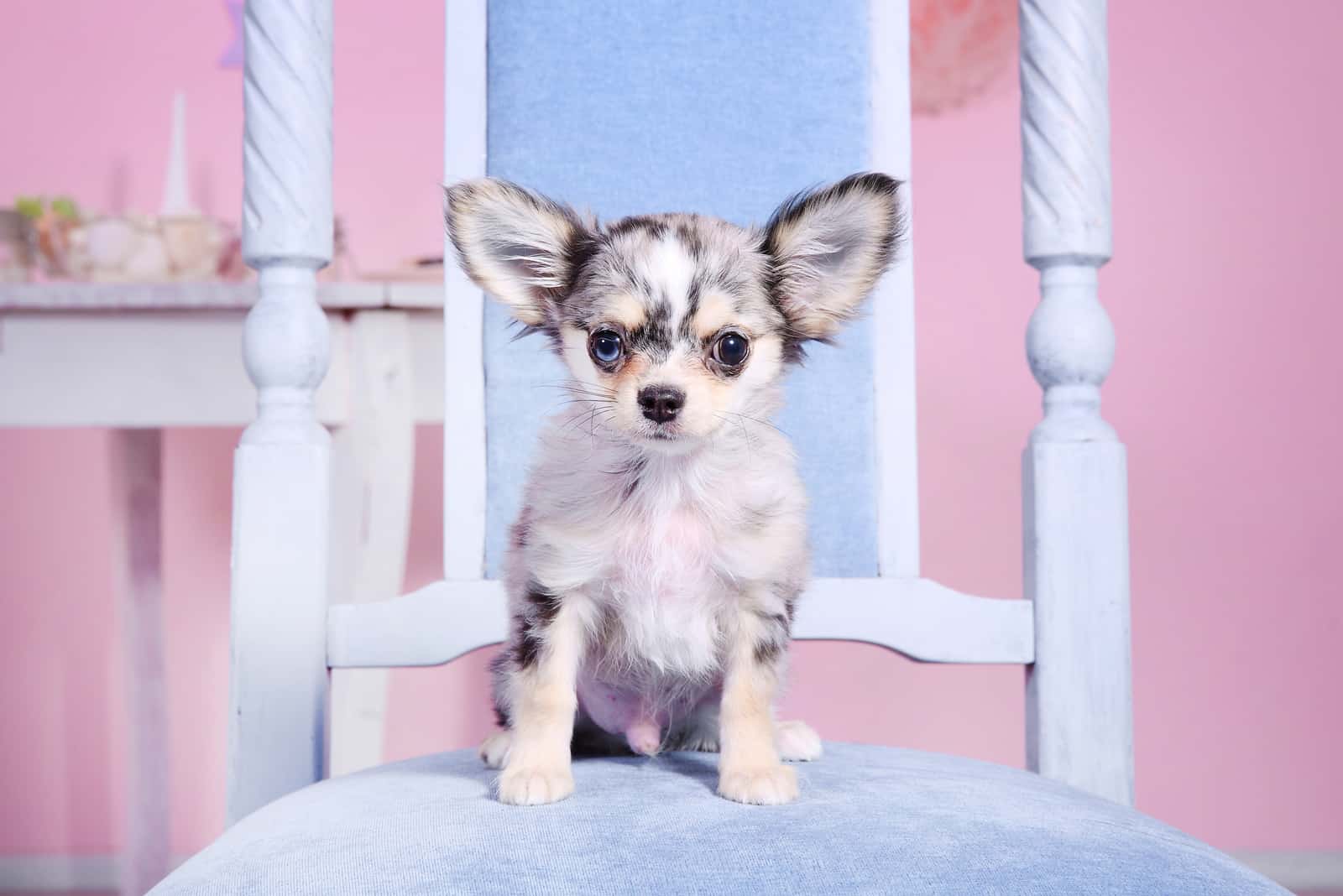
Breeding two merle Chihuahuas can cause some substantial health problems for these little dogs. This is why almost no breeder will dare to do this.
A double merle offspring can result in puppies with skin sensitivities, hearing problems, and eye issues.
Sometimes, these health complications can be so severe that they might cause complete deafness, blindness, abnormally small eyes, and coloboma (lack of eye tissue).
Sadly, the issues don’t end there. Along with eye and ear abnormalities, defects can occur in a Chihuahua’s reproductive, skeletal, or cardiac systems.
In fact, health complications are common for all merle Chihuahuas.
While most Chis don’t have these problems, in merle Chihuahua’s, they are prevalent. In double merle offspring, the chances of having a pup with defects hugely increase. This is because the merle gene doesn’t exist naturally in a Chihuahua’s DNA.
The reason behind these health complications is the merle gene itself. It acts on other genes, making them lighter. This whitening process is what causes certain defects.
As the dog’s coat becomes whitened, it also makes the pigments inside its ears and eyes whiten. The nerve endings atrophy or even die entirely, making your pooch blind or deaf.
These problems are common both with a heterozygous merle (a merle pup with just one merle parent) and with a homozygous merle (a double merle).
However, double merle puppies usually experience much more severe skeletal and cardiac issues.
While there isn’t a lot of research on merle Chihuahuas, scientists did study the merle gene in Dachshunds.
They discovered that the Wiener Dog with just one merle parent had around a 36.8% chance of developing some hearing abnormality!
Issues with their sight, heart, and bones were also widespread.
Many dog breeders also stated that they usually don’t tell future dog owners that their future pooch is a double merle or don’t mention the possible health problems.
If you’re keen on getting a Chi in merle color, be prepared that your pup might have plenty of health issues and a shorter lifespan.
Fortunately, you may notice double merles by their specific appearance that includes a pure white coat and blue eyes. In fact, the eye and the nose color is the biggest difference between double merles and white Chihuahuas.
There Are So-Called Ghost Merles
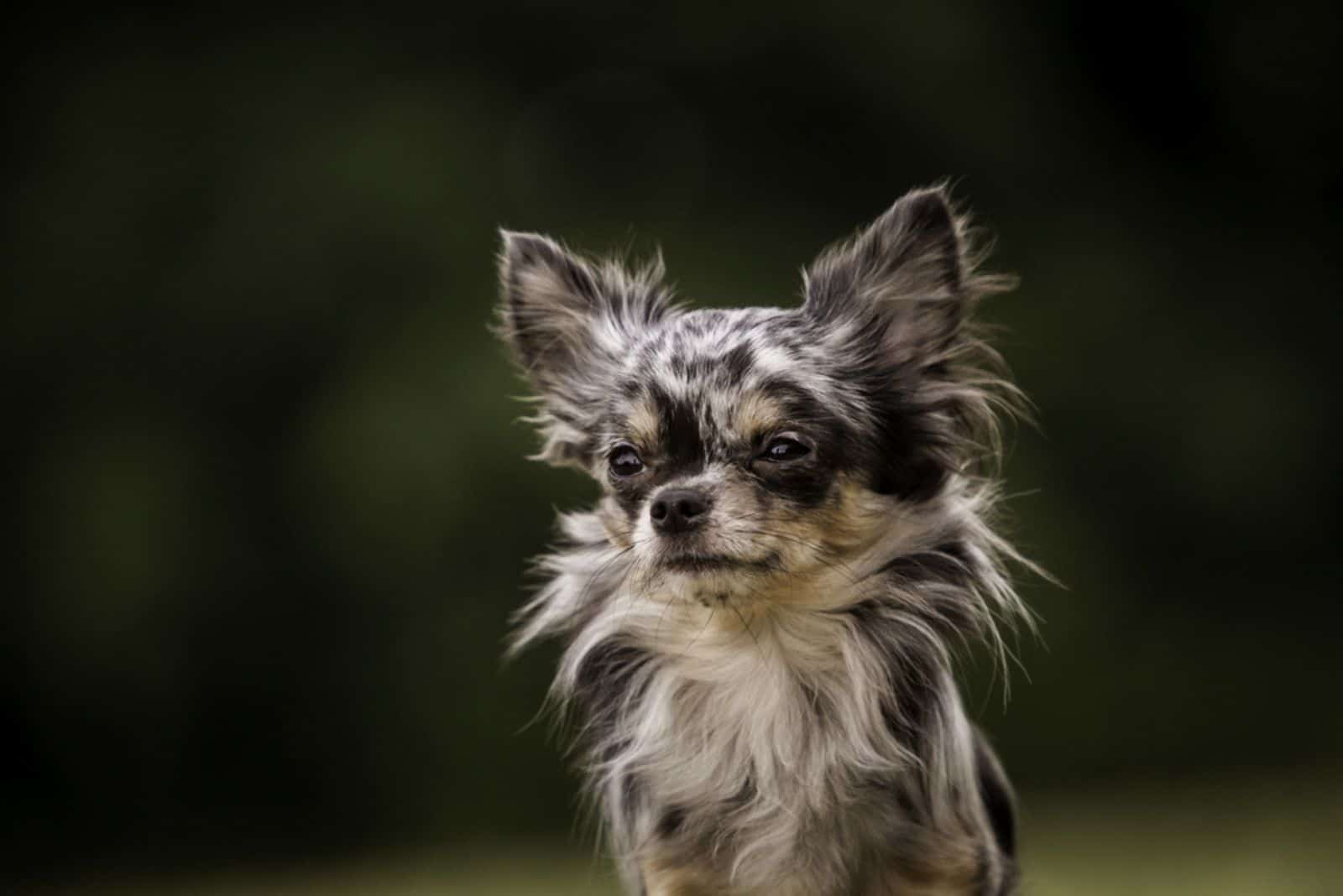
Other than merles, there are so-called ghost merles, also known as phantom merles or cryptic merles. These are Chis with a merle gene, but without any visible proof of this – in other words, they don’t have any skin or fur discoloration.
Cryptic merles are very difficult to figure out as the only way you can know if your Chi is merle is to conduct DNA testing.
They are common in red, fawn, and gold coat colors, and it might not be easy to differentiate the different shades.
It is not enough to breed your pup in order to understand if he is a merle or not. Chihuahuas usually have small litters, and not all offspring will inherit the merle gene.
Even when they do, if they are the same color as their cryptic merle parent, the pattern might not show.
Purposefully breeding merle Chihuahuas with colors or patterns that might result in cryptic merles isn’t ethical, and many organizations, such as the Chihuahua Club of America, forbid it.
This means that a merle Chihuahua shouldn’t be bred with a cream, sable, brindle, or recessive red matte.
Some cryptic merles can have visual merling as puppies, then lose it as they grow older. Others, however, won’t experience patterns at all.
Intentional breeding of cryptic merles might result in unwanted future merle puppies, and this isn’t moral. Merle breeding should always be done in a controlled environment, so that the breeder can be prepared for any possible defects.
There Are Several Limitations
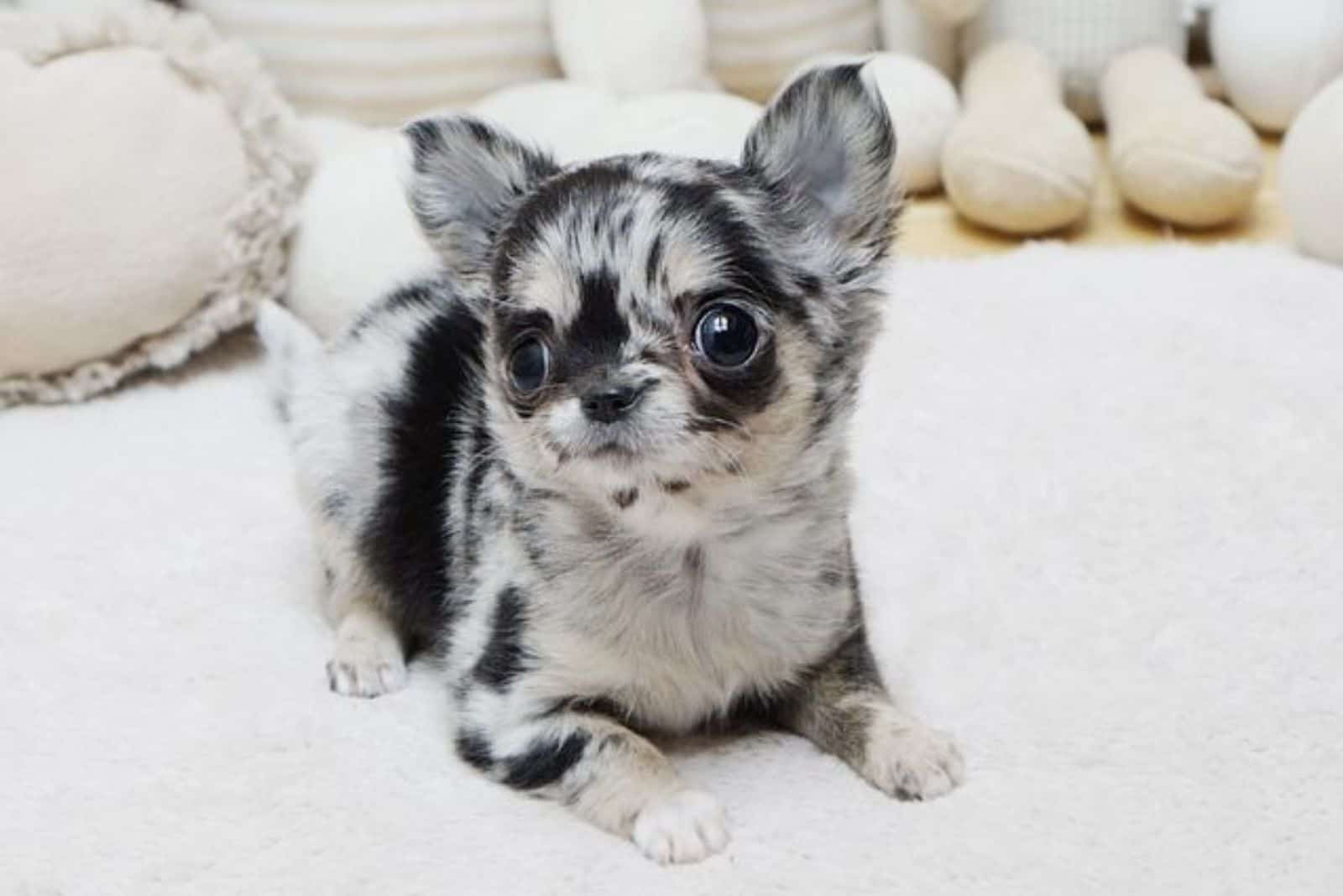
Most kennel clubs recommend that there should be specific rules and limitations in the merle dogs’ coats. Merle breeds on their own limit how many white markings a dog will exhibit.
Following these rules, you shouldn’t breed a merle with a piebald or dogs with an excessive number of spots. Also, any dog that is mostly white with just a few spots shouldn’t be bred with merles.
If you want to breed your merle Chihuahua, you should pick a Chi that doesn’t have more than 33% of white hair. A good choice would be a pup with a typical Irish marking pattern.
This is because the more white markings your dog has, the bigger the chances are of him having genetic defects.
While this research isn’t entirely complete, all the results point towards a particular connection between the white fur and vision and hearing. Until the study is comprehensive, it would be best to follow the said rules to avoid any risks.
Ask the Right Questions

When a breed is relatively rare, its price will rise, especially if they come from a good family that won some dog shows. Merle Chihuahuas are very rare and controversial at the same time.
Still, they aren’t much more expensive than regular Chihuahuas. Most breeders sell them at the price of around $1,500.
If you’re eager to find a merle Chihuahua, the best place to look is the AKC Marketplace. They list only reputable breeders who follow strict breeding practices.
If you don’t see any merle Chis there, try looking for breeders affiliated with some trustworthy dog lover society, such as the Chihuahua Club of America.
Keep in mind that you shouldn’t just go and buy the first Merle you find. Ask the breeder questions about the pup’s genealogy, his parents, and their health history.
They should also know what dog breed your future Chi got the merle gene from since they’re the ones breeding them.
Can You Register Your Merle Chi
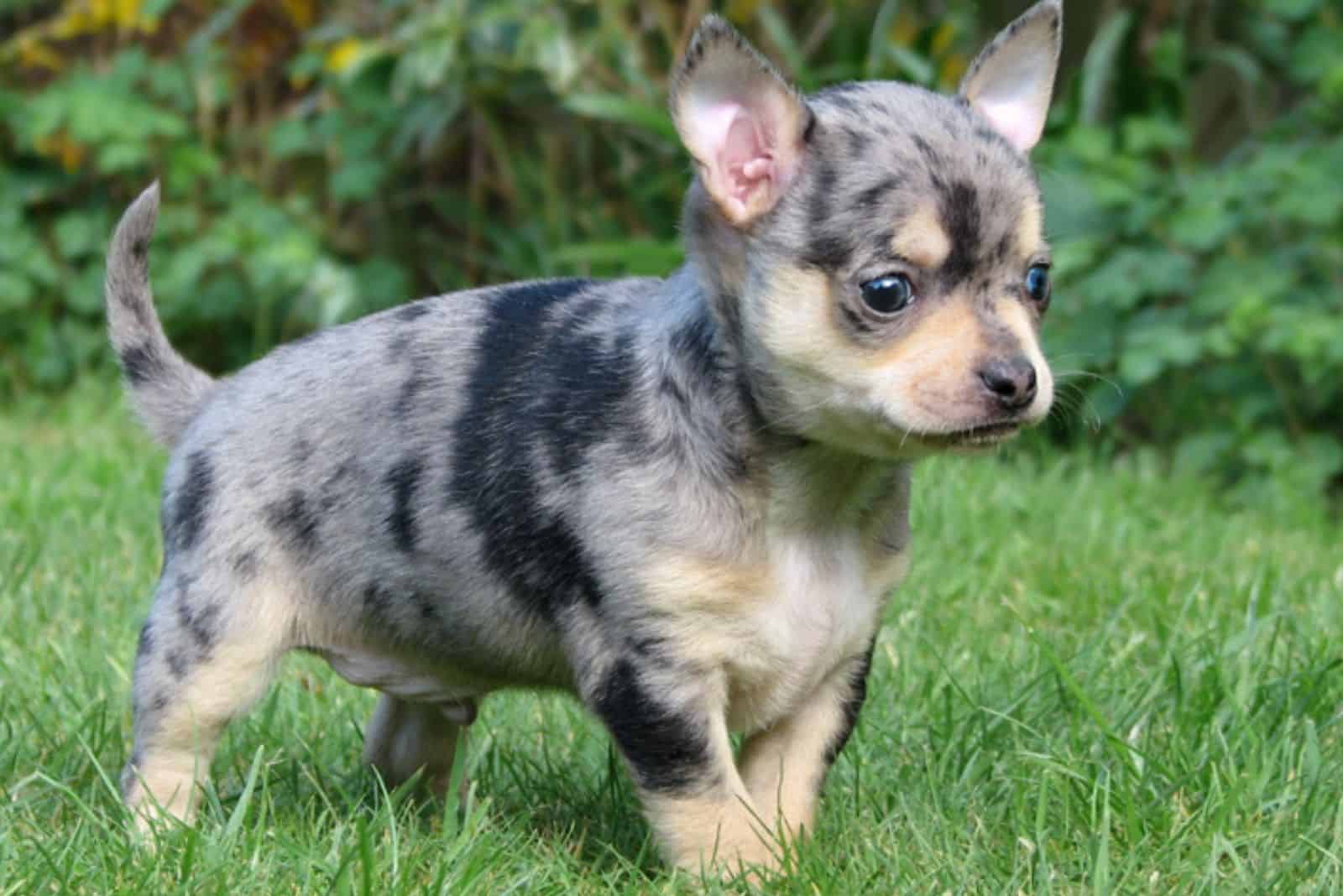
Since merle isn’t a pattern that naturally occurs in Chihuahuas, you may wonder what Chihuahua colors are considered acceptable.
According to the AKC, Chis can come in colors such as black, white, gray, chocolate, silver, brindle, spotted, and tricolor. Merle isn’t considered a standard color in this dog breed.
In fact, on the Kennel Club’s color list, you may see that some colors are marked as ‘color not recognized’. What does this mean?
The ‘color not recognized’ option means that the dog can be registered with the AKC if they are eligible by other means – for example, by having a traceable pedigree ancestry – even though they don’t come in a standard color.
This might make you think that a merle Chihuahua can also be registered under this option.
However, this is not the case, and there is no way for the AKC to register a merle Chihuahua.
Merle Chihuahuas born before 1st March 2007 could be registered as purebred dogs, but for younger dogs, this is no longer a possibility.
This is because, as we’ve already stated, a merle Chihuahua isn’t really considered a purebred dog, even if it does look like one. They have to have at least one non-Chihuahua parent.
Not just that, but in 2009, the AKC updated that any offspring from a merle parent wouldn’t be able to be registered. Since 2013, this includes double merles as well.
There are no loopholes to this rule. A merle Chihuahua cannot be registered with the AKC in any possible way.
Take Good Care of Your Pup
Chihuahuas are dogs with a saucy personality and cute and unique looks. Still, despite their small size, they might need a lot of care. This is especially the case for your merle Chihuahua.
No matter the color of your pup, you should always give him enough love and attention. Take him out for long walks and shower them with treats when they deserve it.
This is the best way to let them know they shouldn’t be aggressive to stay in charge.
Keep in mind that you shouldn’t go overboard with food. Chihuahuas are prone to obesity, and having a fat Chi isn’t good for neither you nor your pup!
However, merle Chis tend to fall in love with just one person, and they can become overly protective. This is the reason why some owners love them. Others, however, find their personality to be endearing.
Chihuahuas aren’t bad dogs, but they can be misunderstood. The same goes for Merles. They’ll love you to the moon and back.
Overall, it would be best if you didn’t treat your merle Chihuahua any differently than any other Chi – or any other dog, for that matter. However, as they tend to have some health issues, you might want to have your vet on speed dial.
Even if your Merle has some special needs, take good care of him. It’s a miracle what a little love and attention can do for a dog. Not to mention that it will guarantee you have a devoted and loyal pet.
Read Next:
• What Causes Crying Chihuahua & How You Can Help Your Dog
• Seven Chihuahua Breeders In Oregon With Credibility

